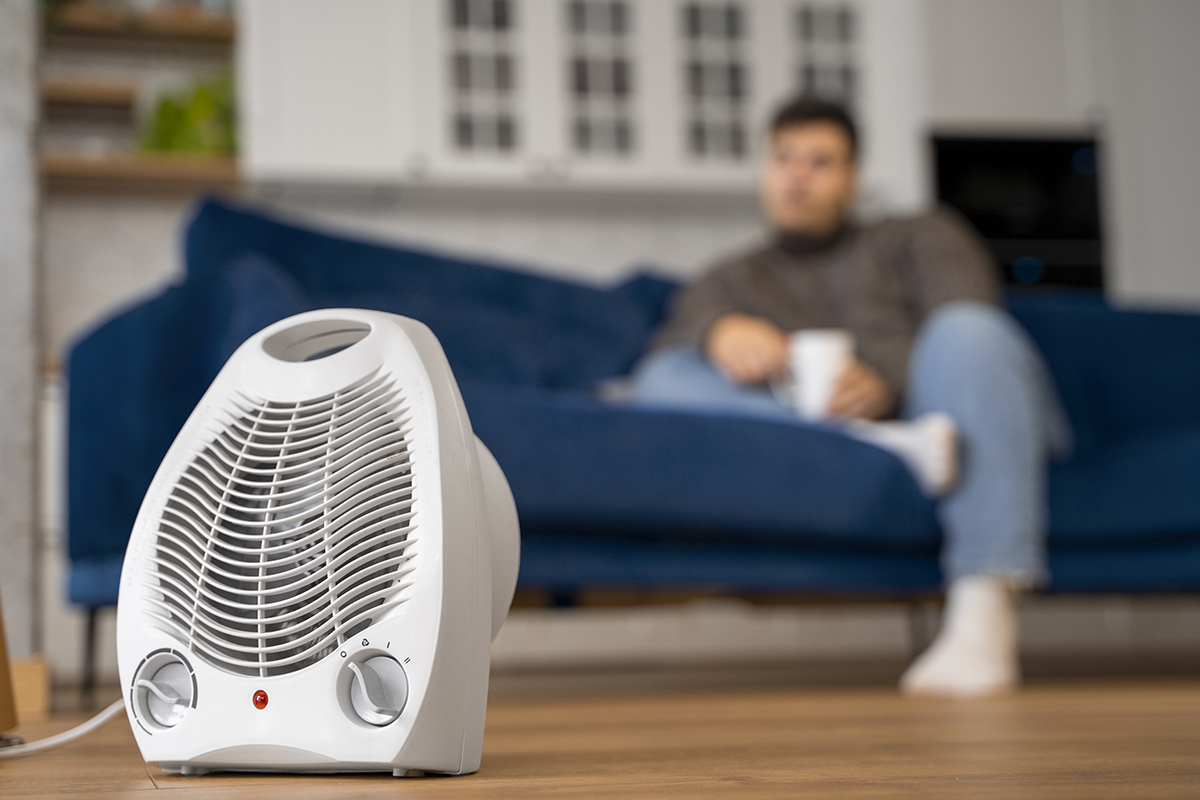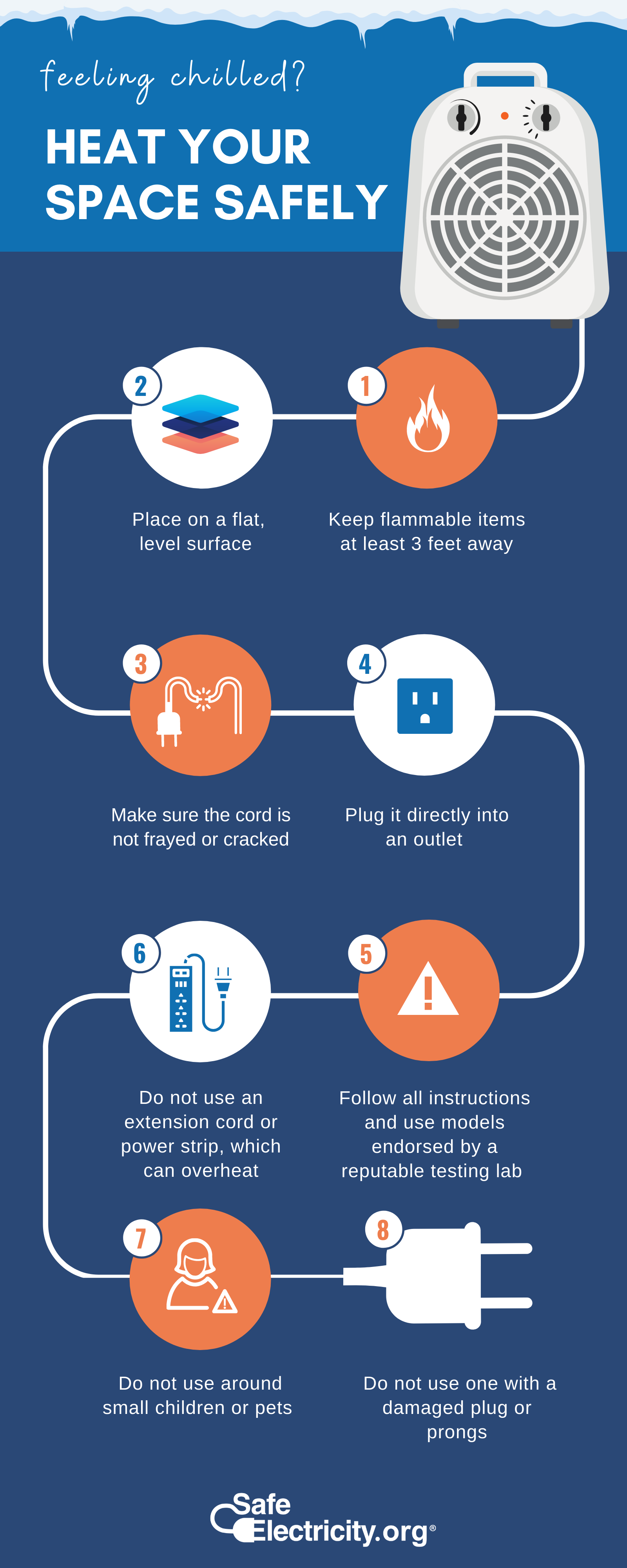
Small space heaters are meant to do exactly as their name says: heat a small space. But unfortunately, many people use portable space heaters to heat their entire home, which can really take a toll on your energy bills. The truth is, whether you should use space heaters really depends on your home’s efficiency and energy needs.
If you’re using a space heater to compensate for problems in your home, like inadequate insulation, drafty windows and exterior doors, or an inefficient heating system, space heaters are not a practical solution. Your best bet is to improve the overall efficiency of your home. If you’re on a tight budget, caulking and weather stripping around windows and exterior doors is a low-cost, easy way to save energy. Depending on the size of your home, adding insulation can be a great next step. (Learn more about our attic insulation incentive.)
Consider alternative ways to stay warm like extra layers of clothing or UL-approved electric blankets. If you have hardwood or tile floors, lay down area rugs to provide additional insulation and maintain warmth.
Taking these proactive energy-saving measures rather than relying on space heaters for supplemental warmth can reduce your heating and cooling bills for years to come.
Space Heater Safety
Perhaps your home is energy efficient but you’re cold-natured and want a specific room to be cozier than the rest. In this case, a space heater may work for your needs. A good comparison is ceiling fans; we use ceiling fans in the summer to cool people, not rooms. A space heater can be used in a similar way during winter months. Only use a space heater in small spaces that you’re occupying and, if possible, try to shut off other rooms to contain the warmth provided by the space heater. If you decide to use a space heater, make sure the heater is properly sized for the space; most heaters include a general sizing table. Also, choose a thermostatically controlled heater to avoid energy waste and overheating.
Please remember that space heaters can pose significant fire and electric shock hazards if not used properly. Fire and electrical hazards can be caused by space heaters without adequate safety features, space heaters placed near combustibles, or space heaters that are improperly plugged in.
Heating equipment is one of the leading causes of home fire deaths according to the National Fire Protection Association (NFPA). Fire departments responded to an estimated average of 44,210 fires involving heating equipment per year from 2016-2020, accounting for 13% of all reported home fires during this time, and these fires resulted in 480 civilian deaths annually.
Based on 2016-2020 annual averages:
- Space heaters were responsible for the largest shares of losses in home heating equipment fires, accounting for one-third of the fires, but nearly nine out of ten deaths and four out of five of the injuries in home fires caused by heating equipment.
- Fires originating in a kitchen or cooking area accounted for the largest share of home heating fires (17%).
- While the larger (non-confined) fires involving fireplaces or chimneys were involved in fewer than one in ten fires caused by heating equipment (7%), they caused just over one-fifth of the direct property damage (22%).
- Nearly half of the heating equipment fires (46%) occurred in the three-month period from December through February.
Safety should always be a top consideration when using space heaters.
Here are some tips for keeping your home safe and warm when it’s cold outside:
- Make sure your space heater has the label showing that it is listed by a recognized testing laboratory.
- Before using any space heater, read the manufacturer’s instructions and warning labels carefully.
- Inspect heaters for cracked or broken plugs or loose connections before each use. If frayed, worn or damaged, do not use the heater.
- Never leave a space heater unattended. Turn it off when you’re leaving a room or going to sleep, and don’t let pets or children play too close to a space heater.
- Space heaters are only meant to provide supplemental heat and should never be used to warm bedding, cook food, dry clothing or thaw pipes.
- Install smoke alarms on every floor of your home and outside all sleeping areas and test them once a month.
- Proper placement of space heaters is critical. Heaters must be kept at least three feet away from anything that can burn, including papers, clothing and rugs.
- Locate space heaters out of high traffic areas and doorways where they may pose a tripping hazard.
- Plug space heaters directly into a wall outlet. Do not use an extension cord or power strip, which could overheat and result in a fire. Do not plug any other electrical devices into the same outlet as the heater.
- Place space heaters on level, flat surfaces. Never place heaters on cabinets, tables, furniture, or carpet, which can overheat and start a fire.
- Always unplug and safely store the heater when it is not in use.
Sources: Safe Electricity, Electrical Safety Foundation, and National Fire Protection Association


